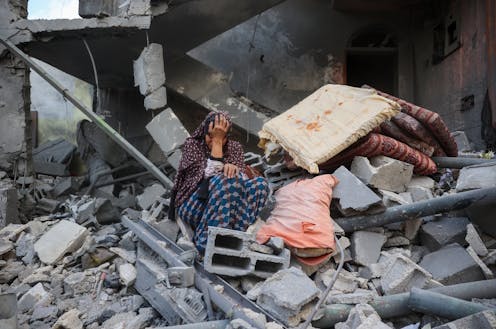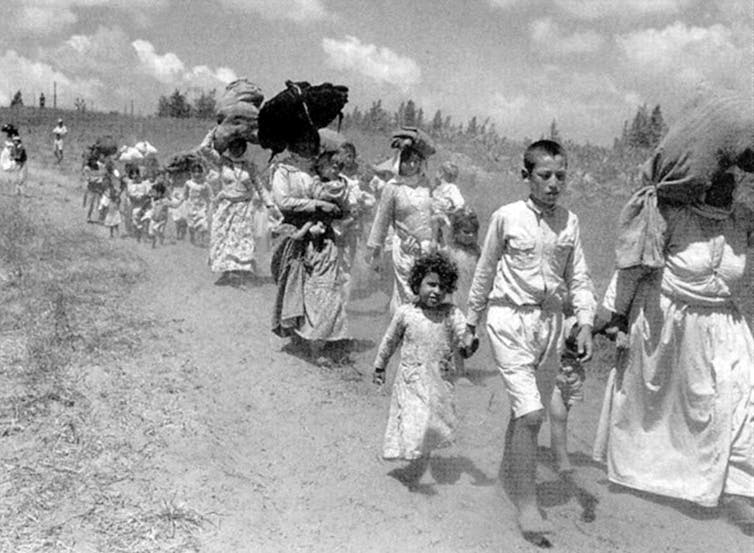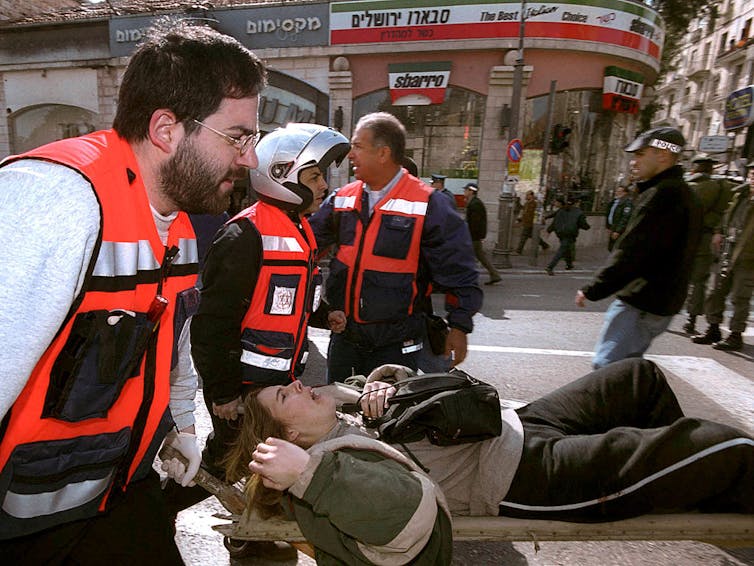In Israel, calls for genocide have migrated from the margins to the mainstream
- Written by Tamir Sorek, Liberal Arts Professor of Middle East History, Penn State
 A Palestinian woman cries while sitting on the rubble of her home, which was destroyed in an Israeli strike on March 18, 2025.Eyad Baba/AFP via Getty Images
A Palestinian woman cries while sitting on the rubble of her home, which was destroyed in an Israeli strike on March 18, 2025.Eyad Baba/AFP via Getty ImagesThirty years ago in Israel, advocating for genocide could land you in prison.
In April 1994, an Israeli rabbi named Ido Alba published an article that read, in part, “In war, as long as the war has not been decided, it is a commandment to kill every non-Jew from the nation one is fighting against, even women and children. Even when they do not directly endanger the one killing them, there is concern that they may assist the enemy in the continuation of the war.”
An Israeli court convicted Alba for incitement to racism and encouraging violence and sentenced him to four years in prison.
Now the legal system is ignoring similar rhetoric.
In December 2023, following the Hamas attack on Oct. 7, 2023, which resulted in the killing of approximately 1,200 Israeli civilians, soldiers and migrant workers, Rabbi Moshe Ratt, who’s seen as a public intellectual among Israeli West Bank settlers, composed a long post on Facebook.
In it, he noted that in the past, some people may have struggled with the morality of destroying an entire people, including women and children. Now they don’t. Obliquely referring to the Palestinians, he added, “Some nations have descended into such depths of evil and corruption that the only solution is to eradicate them completely, leaving no trace.”
More recently, on Feb. 24, 2025, Nissim Vaturi, one of the deputy speakers in the Knesset, Israel’s parliament, called for killing all Palestinian adults in Gaza.
Ratt’s and Vaturi’s words went unpunished. In fact, genocidal rhetoric like theirs – in which the entire destruction of a people is proposed – has become more common in Israel.
As a scholar of Israeli society, I’ve written about how calls for the eradication of Palestinians didn’t simply emerge out of the violence on Oct. 7, 2023.
They date back to the 1930s, and have gained steam – and more public acceptance – as prospects for peace fell apart in the 1990s, existential anxiety among Israelis has grown, and religious Zionists have gained more political power in the 21st century.
Colonial anxieties
Calls to eliminate the Palestinian presence date to before Israel’s official founding in 1948. When Zionist immigration to the region began at the end of the 19th century, less than 10% of the population was Jewish. The native, largely Muslim population represented a fundamental obstacle to establishing a Jewish state.
The founding fathers of Zionism openly discussed ideas for relocating Palestinians, which were usually envisioned as voluntary. These notions are not entirely unlike U.S. President Donald Trump’s proposal to transfer Palestinians from Gaza to other countries.
Attempts to dispossess majority indigenous populations are usually violent themselves, however, and almost always run up against resistance. For example, clashes took place between British colonists and Native Americans in the 17th century, between Dutch colonists and South African tribes in the 17th century, and between Han Chinese and Tibetans in the 20th century. In that same vein, conflict between Zionist settlers and Palestinians has existed from the outset.
Repeated violence and attacks can fuel existential anxiety among settlers, along with fantasies of achieving “permanent security” or absolute safety against future threats. Among Jewish Israelis, the collective memory of persecution – culminating in the genocide of European Jews during the Holocaust – has added another important layer to the longing for permanent security.
Biblical genocidal stories
In Israel, there’s also a history of biblical justifications for violence and genocide. This sort of rhetoric has waxed and waned over time; it’ll often exist on the margins in times of relative peace, but move into the mainstream during periods of violence and existential anxiety.
Most of the forerunners of modern Zionism saw themselves as secular. Nonetheless, they adopted major Jewish symbols and treated Jewish tradition and religious texts as a source of inspiration, even as they didn’t ascribe them legal authority.
This created an opening for political leaders to use biblical texts to promote political goals.
The Bible contains some explicit narratives of annihilation. The most well known is the story of Amalek, a nomadic people identified in the Book of Deuteronomy as the archenemy of the Israelites. In Chapter 25, Moses commanded the Israelites to “blot out the remembrance of Amalek from under heaven.” A related commandment involves the annihilation of the Seven Nations of Canaan, which inhabited the “promised land” when the Israelites conquered it. In Chapter 20, the Israelites are commanded: “You shall not leave a single soul alive. Completely destroy.”
 A 1754 painting depicts the battle between the Israelites and the Amalekites.Heritage Images/Hulton Fine Art Collection via Getty Images
A 1754 painting depicts the battle between the Israelites and the Amalekites.Heritage Images/Hulton Fine Art Collection via Getty ImagesThroughout Jewish history, these edicts and stories have generally been interpreted as historical accounts or as metaphors, not commands to commit genocide.
However, settlers of lands occupied by indigenous peoples – not just in Israel, but in other countries, too – have deployed these texts to condone mass violence. For example, in colonial America, Puritan settlers justified massacres of Native Americans by comparing them with Amalek.
During the Arab-Israeli war in 1948, Israeli army education officers distributed texts to soldiers that read, “In biblical times, Saul exterminated all of Amalek, men and women, youth and elderly, and even sheep and cattle.” The materials also noted that “biblical Joshua was commanded to annihilate the nations of the land and was forbidden to make any treaties with them.”
During that war, Israel uprooted an estimated 750,000 Palestinians. Israeli forces and civilians killed thousands who attempted to return over the ensuing years.
 Roughly 750,000 Palestinians were displaced from their homes in 1948.History/Universal Images Group via Getty Images
Roughly 750,000 Palestinians were displaced from their homes in 1948.History/Universal Images Group via Getty ImagesMessianistic forces unleashed
After the 1948 Arab-Israeli war, this sort of religious justification for wiping out the Palestinians returned to the margins.
But another development would fuel genocidal rhetoric.
Decisive military victories during the 1967 Arab-Israeli war, also known as the Six-Day War, involved the Israeli conquest of holy sites in the West Bank. Many religious Zionists perceived the military victories as miraculous.
For religious Zionists, the state of Israel is a sacred endeavor. They’ve generally been less interested than secular Zionists in adhering to international norms and taking geopolitical considerations into account when pushing for the settlement of contested territories.
After 1967, religious settler movements were emboldened. Groups such as Gush Emunim pushed the government to settle the newly occupied territories, which included the West Bank and the Gaza Strip. For these religious Zionists, the settlement project is not simply a land grab: Settlers are taking land that the Bible has promised to them.
In 1980, Israel Hess, who then held the official position as rabbi of Israel’s Bar-Ilan University, wrote in the student bulletin, “In a war between Israel and Amalek, it is a commandment to kill and annihilate infants and babies. And who is Amalek? Anyone who launches a war against the Jews.” These words triggered public backlash and prompted protests from several secular Zionist politicians.
Existential fears grow
In the 1990s, calls for widespread violence were largely marginalized, since there was hope for a political compromise with the Palestinians.
After these talks failed, however, the rhetoric and ideas of religious Zionists continued to migrate to the political center, particularly during and after the Palestinian uprising known as the Second Intifada. Taking place from 2000 to 2005, the uprising involving a series of suicide attacks in Israeli cities profoundly shocked the Jewish Israeli public, spurring the reemergence of deep existential anxiety.
 Rescue workers rush an injured Israeli woman from the scene of a Palestinian suicide bombing on Jan. 27, 2002, in Jerusalem.Getty Images
Rescue workers rush an injured Israeli woman from the scene of a Palestinian suicide bombing on Jan. 27, 2002, in Jerusalem.Getty ImagesWith no peaceful solution for the conflict on the horizon, Israeli and Palestinian figures who viewed politics through a theological framework kept accumulating power.
In 2014, Ayelet Shaked, then a member of the Knesset and later the minister of justice, shared an article on social media that read, “The Palestinian people declared war on us, and we have to fight back … and in wars the enemy is usually an entire people, with its old men and women, its cities and villages, its property and infrastructure.”
Meanwhile, the dean of Quranic studies at the Islamic University of Gaza said in a 2015 television interview, “All Jews in Palestine today are fair game – even the women.”
As each side retaliated against the other, annihilation started to sound like a reasonable solution – a process that historian Yoav Di-Capua has termed “genocidal mirroring.”
The perfect storm
This mirroring does not imply a symmetry. Israel, with its superior military capabilities, has a significantly greater capacity to inflict harm on Palestinians.
The government formed in Israel following the 2022 election was unprecedented. For the first time in the nation’s history, the government depended upon ultranationalist religious factions, such as one called Jewish Power. The party has three official rabbis who advise its politicians. One of them, Dov Lior, is a prominent advocate of the idea that Palestinians are Amalek. Another, Yisrael Ariel, has written that the Torah’s commandment “Thou shalt not kill” does not apply to non-Jews.
When the Oct. 7, 2023, Hamas attacks reignited Israelis’ deep-seated fears of annihilation, calls for indiscriminate revenge grew louder.
As Rabbi Eliyahu Mali, the head of a military program for religious students in Jaffa, said in March 2024:
“If you don’t kill them first, they will kill you. The terrorists of today are the children of the previous operation whom you kept alive, and the women are those who produce the terrorists … Do not try to outsmart the Torah. The Torah tells you: ‘Do not keep alive any soul,’ so you should not keep alive any soul.”
Some secular Israelis joined in. Danny Neuman, a former football star and television commentator, said on TV in December 2023, “I am telling you, in Gaza, without exception, they are all terrorists, sons of dogs. They must be exterminated, all of them killed.”
Kinneret Barashi, a lawyer and a television host, tweeted in February 2025, “Every trace of the murderous mutations in Gaza must be erased, from the delivery rooms to the last elderly person in Gaza.”
These statements coincide with a grim reality on the ground. Since the Oct. 7 attacks, Israeli retaliation in Gaza has cost the lives of more than 64,000 Palestinians. Public health experts estimate that the obliteration of infrastructure and corresponding starvation, lack of access to medical care and spread of infectious diseases, could bring the death toll to the hundreds of thousands.
Meanwhile, large swaths of the Israeli public appear to support the mass expulsion of Palestinians and condone the concept of genocide in the abstract, according to a recent poll I commissioned through the Israeli polling firm Geocartography.
In the representative sample of Jewish Israelis who were polled from March 10-11, 2025, 82% supported the forced expulsion of Gaza’s population to other countries, while 56% endorsed the expulsion of Israel’s Arab citizens. By comparison, according to a 2003 poll, only 46% supported the “transfer of Palestinian residents of the occupied territories,” and just 31% supported the “transfer of Israel’s Arab citizens.”
Moreover, in my poll I relayed a story from the Book of Joshua, in which the ancient Israelites conquered the city of Jericho and killed all of its inhabitants.
When I asked respondents whether the Israeli army, when conquering an enemy city, should act similarly to the Israelites when they conquered Jericho, 47% of respondents said they should.
Tamir Sorek previously received funding from the Fullbright Program and the Alexander Von Humboldt Foundation.
Authors: Tamir Sorek, Liberal Arts Professor of Middle East History, Penn State

